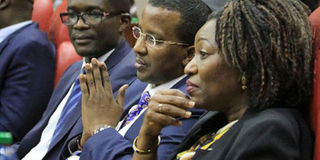Need for a more nuanced understanding of relationship between religion, public life

From left: Independent Electoral and Boundaries Commission Chief Executive Officer Ezra Chiloba, Chairman Issack Hassan and Vice-Chairperson Lilian Mahiri-Zaja before a joint parliamentary select committee on the body at Parliament Buildings on August 2, 2016. PHOTO | JEFF ANGOTE | NATION MEDIA GROUP
What you need to know:
- As we seek to engage with religious leadership in reform process, it is important to interrogate individual religious leaders.
- We must look into the past involvement of the clergy and assess its performance.
A panel to identify new officials to replace the current ones of the much-discredited Independent Electoral and Boundaries Commission is expected to be drawn from the Parliamentary Service Commission and the clergy.
My attention is drawn to the role of religious actors in this process as it raises an important question about the relationship between religion and public life in Kenya.
According to the proposal, the religious leaders will be drawn from the Kenya Conference of Catholic Bishops, the National Council of Churches of Kenya, the Evangelical Alliance of Kenya, the Supreme Council of Kenya Muslims, the National Muslim Leaders Forum, the Council of Islamic Preachers of Kenya and Ulamaa, and the Hindu Council of Kenya.
These categories point to the fact that religious authority in Kenya is distributed over an increasing number of actors. It is also highly differentiated and diffused.
While I am not privy to information on how the decision to choose representations from the various clusters of religious organisations was arrived at, what is clear is that religious actors will play a critical role in determining the composition and nature of the new electoral body.
Although Kenya is by law a secular state with constitutionally enshrined freedom of worship, religion continues to be present in the public sphere, functioning as a key framework for communal life. In the 1990s, religious groups played a constructive and important role in the development of a broad-based movement towards democratisation. Individual clerics bravely opposed the tyrannical regime, sometimes, at great risk to themselves. Without them, the process of constitutional change would have been limited to politicians, journalists, and lawyers.
However, the process of constitutional change also pointed to the limitation of religious engagement in the public sphere. It showed bishops, pastors, and imams can slipping into sectarian competition. For example, on the question of the place of kadhi courts in the Constitution, the public engagement by religious actors did become a point for sectarian divergence, with some Christian groups arguing that such a provision granted Muslims a distinct advantage over other religions.
RELIGIOUS SYMBOLS
Recent cases continue to point to the fact that the political space in Kenya is infused with religious symbols. A day hardly passes without a politician being invited to a church or mosque for all sorts of ceremonies.
In many cases, religious leaders unashamedly go out of their way to seek support, mainly, financial, from politicians. Indeed, some religious leaders have amassed considerable personal wealth courtesy of these symbiotic relations with the political class.
On the other hand, political parties, and their representatives, are always seeking support from what they consider influential religious leaders and their massive following.
Some religious leaders, while appearing non-partisan in their public pronouncements, have deep-seated fears of certain political actors and would do everything possible to nip in the bud the political ambitions of such players.
On the whole, religious actors have followed patterns established by the politics of ethnicity and have a huge inclination towards taking advantage of the post-colonial state.
While religious organisations may continue to make a constructive contribution to public life, their efforts may also be limited by their desire to infuse the public space with their own symbols. Therefore, their rhetoric can reveal as much as obscure what Kenyans want in terms of leadership.
Religious leaders in Kenya are, thus, a product of intense contestation and diverse appropriation by various interest groups.
Prof Paul Gifford, commenting on the Church’s role in politics in Kenya and the public’s lack of trust in it as an objective arbitrator during the 2007-2008 post-election violence, noted: “The common perception that the churches had allowed themselves to be co-opted foreclosed any role like that of the early 1990s.”
As we seek to engage with religious leadership in this important process, it is important to interrogate individual religious leaders. We must look into the past involvement of the clergy and assess its performance, for there is a need for a more nuanced understanding of the relationship between religion and public life.
Joseph Wandera is an Anglican priest and a senior lecturer in the department of religious studies at St. Paul’s University. He coordinates the Centre for Christian-Muslim Relations in Eastleigh; [email protected].





